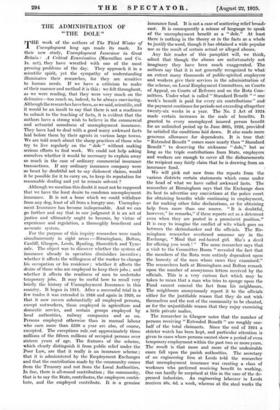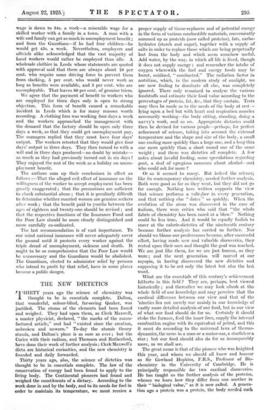THE ADMINISTRATION OF "THE DOLE"
THE work of the authors of The Third Winter of Unemployment long ago made its mark. In their new study, Unemployment Insurcince in Great Britain : A Critical Examination (Macmillan and Co. ls. net), they have wrestled with one of the most pressing problems of the day. They approach it in a scientific spirit, yet the sympathy of understanding illuminates their researches, for they are sensitive to human needs. If we have a criticism to make of their manner and method it is this : we felt throughout, as we were reading, that they were very much on the defensive—too much so, indeed, to be always convincing. Although the researches have been, as we said, scientific, and it would be an insult to say that there is not a readiness to submit to the teaching of facts, it is evident that the authors have a strong wish to believe in the commercial and actuarial soundness of unemployment insurance. They have had to deal with a good many awkward facts laid before them by their agents in various large towns. We are told much about the sharp practices of those who try to live regularly on the " dole " without making serious efforts to find work. We could not help asking ourselves whether it would be necessary to explain away so much in the case of ordinary commercial insurance transactions. If any ordinary insurance company were so beset by doubtful not to say dishonest claims, would it be possible for it to carry on, to keep its reputation for reasonable dealing and yet to remain solvent ?
Although we mention this doubt it must not be supposed that we have the least desire to condemn unemployment insurance. It is not a bone which we could withdraw from any dog, least of all from a hungry one. Unemploy- ment Insurance has become indispensable. And we can go further and say that in our judgment it is an act of justice and ultimately ought to become, by virtue of experience and regulation, a thoroughly beneficent and accurate system.
For the purpose of this inquiry researches were made simultaneously in eight areas :—Birmingham, Bolton, Cardiff, Glasgow, Leeds, Reading, Shoreditch and Tyne- side. The object was to discover whether the system of insurance already in operation diminishes incentive ; whether it affects the willingness of the worker to change his occupation or his residence ; whether it affects the desire of those who are employed to keep their jobs ; and whether it affects the readiness of men to undertake temporary jobs. It may be useful here to recall very briefly the history of Unemployment Insurance in this country. It began in 1911. After a successful trial in a few trades it was extended in 1916 and again in 1920, so that it now covers substantially all employed persons, except outworkers, those employed in agriculture and domestic service, and certain groups employed by local authorities, railway companies and so on. Persons employed otherwise than in manual labour who earn more than £250 a year are also, of course, excepted. The exceptions rule , out approximately three millions of the fifteen millions of occupied persons over sixteen years of age. The features of the scheme, which clearly distinguish it from public relief under the Poor Law, are that it really is an insurance scheme ; that it is administered by the Employment Exchanges and that the contribution made by the community comes from the Treasury and not from the Local Authorities. In fine, there is all-round contribution ; the community, that is to say the State, contributes, the employers contri- bute, and the employed contribute. It is • a genuine insurance fund. It is not a case of scattering relief broad cast. It is consequently a misuse of language to speak of the unemployment benefit as a " dole." At least there is nothing in the theory or in the facts as a whole to justify the word, though it has obtained a wide popular use as the result of certain actual or alleged abuses.
Any fair reader of this pamphlet will, we think,: admit that though the abuses are unfortunately not imaginary they have been much exaggerated. The authors say that it is not generally recognized to what: an extent many thousands of public-spirited employers' and workers give their services in the administration of the scheme, on Local Employment Committees, on Courts: of Appeal, on Courts of Referees and on the Rota Corn-, mittees. Under what is called " Standard Benefit " " one' week's benefit is paid for every six contributions " andi the payment continues for periods not exceeding altogether; twenty-six weeks in a year. The No. 2 Act of 1924: made certain increases in the scale of benefits. Its granted to every unemployed insured person benefit' for an unlimited period up to June 30th, 1926, provided I he satisfied the conditions laid down. It also made more generous allowance for dependents. It is true that ! " Extended Benefit " comes more nearly than " Standard, Benefit " to deserving the nickname " dole," but so' long as the triple contributions from State, employers and workers are enough to cover all the disbursements' the recipient may fairly claim that he is drawing from an insurance fund.
We will pick out now from the reports from the various districts certain statements which come under the head of what we have called awkward facts. The researcher at Birmingham says that the Exchange does its best to advertise any convictions at the police court for obtaining benefits while continuing in employment, or for making other false declarations, or for obtaining help from more than one source. " It is doubtful, however," he remarks," if these reports act as a deterrent even when they are posted in a prominent position." It is easy to imagine the conflict of wits -which goes on between the skrimshanker and the officials. The Bir- mingham researcher overheard someone say in the Exchange, " Mind that red-haired girl. She's a devil for offering you work ! " The same researcher says that a visit to the Committee Room " revealed the fact that the members of the Rota were entirely dependent upon the honesty of the men whose cases they examined." The researchers both at Birmingham and Bolton remark upon the number of anonymous letters received by the officials. This is a very curious fact which may be taken to mean that a man who tries to sponge upon the Fund cannot conceal the fact from his neighbours. The neighbours anonymously report it to the officials either for the justifiable reason that they do not wish themselves and the rest of the community to be cheated, or for the unjustifiable reason that they enjoy exercising a little private malice.
The researcher in Glasgow notes that the number of persons receiving " Extended Benefit " are roughly one- half of the total claimants. Since the end of 1924 a stricter watch has been kept, and particular attention is given to cases where persons cannot show a period of even temporary employment within the past two or more years., The result is that more and more of the undesirable cases fall upon the parish authorities. The secretary of an engineering firm at Leeds told the researcher that unemployment insurance was creating a class of workmen who preferred receiving benefit to working., One can hardly be surprised at this in the case of the de- pressed industries. An engineering labourer in Leeds receives 40s. 6d. a week, whereas at the steel works the wage is down to 84s. a week—a miserable wage for a skilled worker with a family in a town. A man with a wife and family can get as much in unemployment benefit ; and from the Guardians—if he had four children—he would get 45s. a week. Nevertheless, employers and officials alike acknowledged that the vast majority of hand workers would rather be employed than idle. A wholesale clothier in Leeds whose statements are quoted with approval said that there are always about 10 per cent. who require some driving force to prevent them from slacking, 5 per cent. who would never work as long as benefits were available, and 5 per cent. who are Unemployable. That leaves 80 per cent. of genuine triers.
We agree that the payment of benefit to workers who are employed for three days only is open to strong objection. This form of benefit caused a remarkable incident in Leeds which is for many reasons worth recording. A clothing firm was working four days a week and the workers approached the management with the demand that the factory should be open only three days a week, so that they could get unemployment pay. The managers replied that they must have four days' output. The workers retorted that they would give four days' output in three days. They then turned to with a .will and in three days produced—no doubt by mistake— as much as they had previously turned out in six days ! .They enjoyed the rest of the week as a holiday on unem- ployment benefit.
The authors sum up their conclusions in effect as follows :—That the alleged evil effect of insurance on the willingness of the worker to accept employment has been greatly exaggerated ; that the precautions are sufficient to check substantial abuse ; that it is peculiarly difficult to determine whether married women are genuine seekers after work ; that the benefit paid to youths between the ages of eighteen and twenty-one should be revised ; and that the respective functions of the Insurance Fund and the Poor Law should be more clearly distinguished and more carefully co-ordinated.
The last recommendation is of vast importance. To our mind national insurance will never adequately cover the ground until it protects every worker against the ,triple dread of unemployment, sickness and death. It ought to be so comprehensive that the Poor Law would be unnecessary and the Guardians would be abolished. The Guardians, elected to administer relief by persons who intend to profit by that relief, have in some places become a public danger.



































 Previous page
Previous page